中学英语易错集锦大全211道题(全题版)
中学英语易错题集锦大全211道题(精华珍藏版)

中学英语易错集锦大全211道题 (精华珍藏版)1.Because he was ill yesterday, so he didn’t go to work. (×)Because he was ill yesterday, he didn’t go to work. (√)He was ill yesterday, so he didn’t go to work. (√)[析] 用though, but表示“虽然……,但是……”或用because, so 表示“因为……,所以……”时,though和but 及because和so 都只能择一而用,不能两者同时使用。
2.The Smiths have moved Beijing. (×)The Smiths have moved to Beijing. (√)[析] 不及物动词后接名词或代词作宾语时,要在动词之后加上适当的介词;但不及物动词后接home, here, there等副词作宾语时,动词之后不必加任何介词。
3.The box is too heavy for him to carry it. (×)The box is too heavy for him to carry. (√)[析] the box既是这句话的主语, 也是不定式to carry的逻辑宾语,若句末再加上it,就和the box重复了。
4.Each of the boys have a pen. (×)Each of the boys has a pen. (√)[析] 复数名词前有表个体的each of, one of, every,either of等词组修饰,或有表否定的neither of, none of 等词组修饰时,谓语动词要用单数形式。
5.例:那是你心软!我不就是一个例子吗?Neither he nor you is good at English. (×)Neither he nor you are good at English. (√)[析] either... or..., neither... nor..., not only..., but also... 等词组连接句子的两个主语时,谓语动词遵循“就近一致原则”, 即由靠近谓语的那个主语决定谓语的人称和数用何种形式。
中考英语 易错集锦大全211道题

中学英语易错集锦大全211道题 (精华珍藏版)1.Because he was ill yesterday, so he didn’t go to work. (×)Because he was ill yesterday, he didn’t go to work. (√)He was ill yesterday, so he didn’t go to work. (√)[析] 用though, but表示“虽然……,但是……”或用because, so 表示“因为……,所以……”时,though和but 及because和so 都只能择一而用,不能两者同时使用。
2.The Smiths have moved Beijing. (×)The Smiths have moved to Beijing. (√)[析] 不及物动词后接名词或代词作宾语时,要在动词之后加上适当的介词;但不及物动词后接home, here, there等副词作宾语时,动词之后不必加任何介词。
3.The box is too heavy for him to carry it. (×)The box is too heavy for him to carry. (√)[析] the box既是这句话的主语, 也是不定式to carry的逻辑宾语,若句末再加上it,就和the box重复了。
4.Each of the boys have a pen. (×)Each of the boys has a pen. (√)[析] 复数名词前有表个体的each of, one of, every,either of等词组修饰,或有表否定的neither of, none of 等词组修饰时,谓语动词要用单数形式。
5.例:那是你心软!我不就是一个例子吗?Neither he nor you is good at English. (×)Neither he nor you are good at English. (√)[析] either... or..., neither... nor..., not only..., but also... 等词组连接句子的两个主语时,谓语动词遵循“就近一致原则”, 即由靠近谓语的那个主语决定谓语的人称和数用何种形式。
中学英语易错集锦大全211道题 (精华珍藏版)
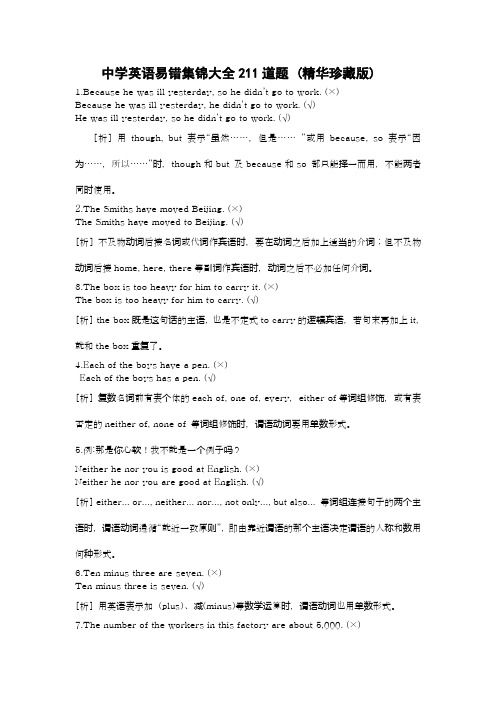
中学英语易错集锦大全211道题 (精华珍藏版)1.Because he was ill yesterday, so he didn’t go to work. (×)Because he was ill yesterday, he didn’t go to work. (√)He was ill yesterday, so he didn’t go to work. (√)[析] 用though, but表示“虽然……,但是……”或用because, so 表示“因为……,所以……”时,though和but 及because和so 都只能择一而用,不能两者同时使用。
2.The Smiths have moved Beijing. (×)The Smiths have moved to Beijing. (√)[析] 不及物动词后接名词或代词作宾语时,要在动词之后加上适当的介词;但不及物动词后接home, here, there等副词作宾语时,动词之后不必加任何介词。
3.The box is too heavy for him to carry it. (×)The box is too heavy for him to carry. (√)[析] the box既是这句话的主语, 也是不定式to carry的逻辑宾语,若句末再加上it,就和the box重复了。
4.Each of the boys have a pen. (×)Each of the boys has a pen. (√)[析] 复数名词前有表个体的each of, one of, every,either of等词组修饰,或有表否定的neither of, none of 等词组修饰时,谓语动词要用单数形式。
5.例:那是你心软!我不就是一个例子吗?Neither he nor you is good at English. (×)Neither he nor you are good at English. (√)[析] either... or..., neither... nor..., not only..., but also... 等词组连接句子的两个主语时,谓语动词遵循“就近一致原则”, 即由靠近谓语的那个主语决定谓语的人称和数用何种形式。
中考英语 易错集锦大全211道题
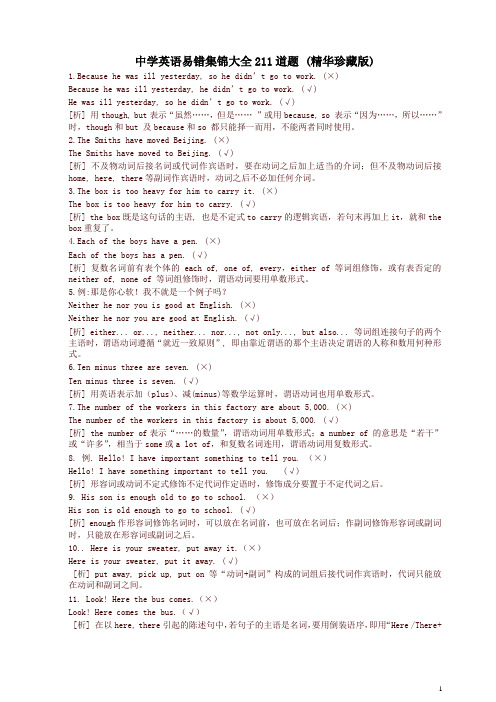
中学英语易错集锦大全211道题 (精华珍藏版)1.Because he was ill yesterday, so he didn’t go to work. (×)Because he was ill yesterday, he didn’t go to work. (√)He was ill yesterday, so he didn’t go to work. (√)[析] 用though, but表示“虽然……,但是……”或用because, so 表示“因为……,所以……”时,though和but 及because和so 都只能择一而用,不能两者同时使用。
2.The Smiths have moved Beijing. (×)The Smiths have moved to Beijing. (√)[析] 不及物动词后接名词或代词作宾语时,要在动词之后加上适当的介词;但不及物动词后接home, here, there等副词作宾语时,动词之后不必加任何介词。
3.The box is too heavy for him to carry it. (×)The box is too heavy for him to carry. (√)[析] the box既是这句话的主语, 也是不定式to carry的逻辑宾语,若句末再加上it,就和the box重复了。
4.Each of the boys have a pen. (×)Each of the boys has a pen. (√)[析] 复数名词前有表个体的each of, one of, every,either of等词组修饰,或有表否定的neither of, none of 等词组修饰时,谓语动词要用单数形式。
5.例:那是你心软!我不就是一个例子吗?Neither he nor you is good at English. (×)Neither he nor you are good at English. (√)[析] either... or..., neither... nor..., not only..., but also... 等词组连接句子的两个主语时,谓语动词遵循“就近一致原则”, 即由靠近谓语的那个主语决定谓语的人称和数用何种形式。
中学英语易错集锦大全211道题
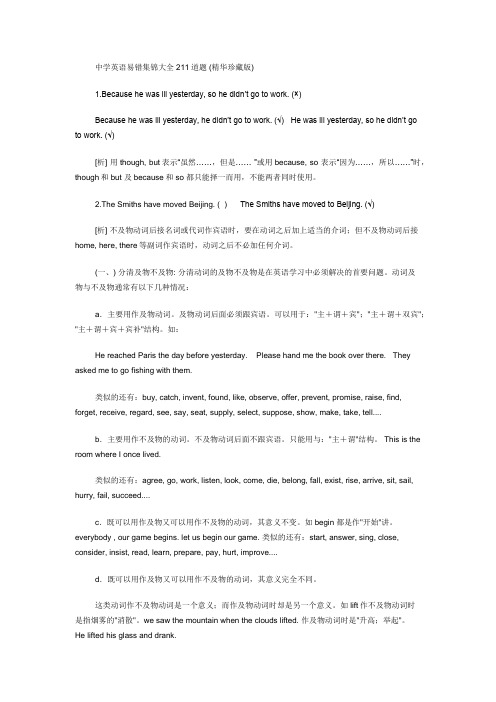
中学英语易错集锦大全211道题 (精华珍藏版)1.Because he was ill yesterday, so he didn’t go to work. (×)Because he was ill yesterday, he didn’t go to work. (√)He was ill yesterday, so he didn’t goto work. (√)[析] 用though, but表示―虽然……,但是…… ‖或用because, so 表示―因为……,所以……‖时,though和but 及because和so 都只能择一而用,不能两者同时使用。
2.The Smiths have moved Beijing. (×) The Smiths have moved to Beijing. (√)[析] 不及物动词后接名词或代词作宾语时,要在动词之后加上适当的介词;但不及物动词后接home, here, there等副词作宾语时,动词之后不必加任何介词。
(一、) 分清及物不及物: 分清动词的及物不及物是在英语学习中必须解决的首要问题。
动词及物与不及物通常有以下几种情况:a.主要用作及物动词。
及物动词后面必须跟宾语。
可以用于:"主+谓+宾";"主+谓+双宾";"主+谓+宾+宾补"结构。
如:He reached Paris the day before yesterday. Please hand me the book over there. They asked me to go fishing with them.类似的还有:buy, catch, invent, found, like, observe, offer, prevent, promise, raise, find, forget, receive, regard, see, say, seat, supply, select, suppose, show, make, take, tell....b.主要用作不及物的动词。
中考英语 易错集锦大全211道题

中学英语易错集锦大全211道题 (精华珍藏版)1.Because he was ill yesterday, so he didn’t go to work. (×)Because he was ill yesterday, he didn’t go to work. (√)He was ill yesterday, so he didn’t go to work. (√)[析] 用though, but表示“虽然……,但是……”或用because, so 表示“因为……,所以……”时,though和but 及because和so 都只能择一而用,不能两者同时使用。
2.The Smiths have moved Beijing. (×)The Smiths have moved to Beijing. (√)[析] 不及物动词后接名词或代词作宾语时,要在动词之后加上适当的介词;但不及物动词后接home, here, there等副词作宾语时,动词之后不必加任何介词。
3.The box is too heavy for him to carry it. (×)The box is too heavy for him to carry. (√)[析] the box既是这句话的主语, 也是不定式to carry的逻辑宾语,若句末再加上it,就和the box重复了。
4.Each of the boys have a pen. (×)Each of the boys has a pen. (√)[析] 复数名词前有表个体的each of, one of, every,either of等词组修饰,或有表否定的neither of, none of 等词组修饰时,谓语动词要用单数形式。
5.例:那是你心软!我不就是一个例子吗?Neither he nor you is good at English. (×)Neither he nor you are good at English. (√)[析] either... or..., neither... nor..., not only..., but also... 等词组连接句子的两个主语时,谓语动词遵循“就近一致原则”, 即由靠近谓语的那个主语决定谓语的人称和数用何种形式。
中学英语易错集锦大全211道题 (精华珍藏版)
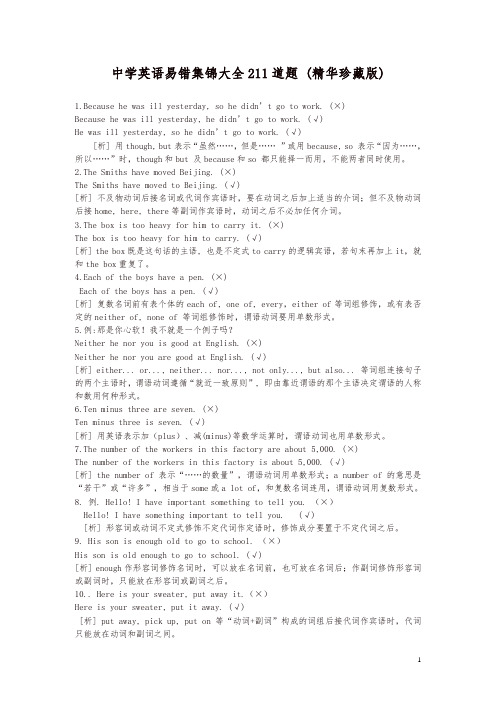
中学英语易错集锦大全211道题 (精华珍藏版)1.Because he was ill yesterday, so he didn’t go to work. (×)Because he was ill yesterday, he didn’t go to work. (√)He was ill yesterday, so he didn’t go to work. (√)[析] 用though, but表示“虽然……,但是……”或用because, so 表示“因为……,所以……”时,though和but 及because和so 都只能择一而用,不能两者同时使用。
2.The Smiths have moved Beijing. (×)The Smiths have moved to Beijing. (√)[析] 不及物动词后接名词或代词作宾语时,要在动词之后加上适当的介词;但不及物动词后接home, here, there等副词作宾语时,动词之后不必加任何介词。
3.The box is too heavy for him to carry it. (×)The box is too heavy for him to carry. (√)[析] the box既是这句话的主语, 也是不定式to carry的逻辑宾语,若句末再加上it,就和the box重复了。
4.Each of the boys have a pen. (×)Each of the boys has a pen. (√)[析] 复数名词前有表个体的each of, one of, every,either of等词组修饰,或有表否定的neither of, none of 等词组修饰时,谓语动词要用单数形式。
5.例:那是你心软!我不就是一个例子吗?Neither he nor you is good at English. (×)Neither he nor you are good at English. (√)[析] either... or..., neither... nor..., not only..., but also... 等词组连接句子的两个主语时,谓语动词遵循“就近一致原则”, 即由靠近谓语的那个主语决定谓语的人称和数用何种形式。
中学英语易错集锦大全211道题 (精华珍藏版)

中学英语易错集锦大全211道题(精华珍藏版)本人所整理收集内容基本囊括初中阶段英语易错内容大全1.Because he was ill yesterday, so he didn’t go to work. (×)Because he was ill yesterday, he didn’t go to work. (√)He was ill yesterday, so he didn’t go to work. (√)[析] 用though, but表示“虽然……,但是…… ”或用because, so 表示“因为……,所以……”时,though 和but 及because和so 都只能择一而用,不能两者同时使用。
2.The Smiths have moved Beijing. (×) The Smiths have moved to Beijing. (√)[析] 不及物动词后接名词或代词作宾语时,要在动词之后加上适当的介词;但不及物动词后接home, here, there等副词作宾语时,动词之后不必加任何介词。
3.The box is too heavy for him to carry it. (×) The box is too heavy for him to carry. (√)[析] the box既是这句话的主语, 也是不定式to carry的逻辑宾语,若句末再加上it,就和the box 重复了。
4.Each of the boys have a pen. (×) Each of the boys has a pen. (√)[析] 复数名词前有表个体的each of, one of, every,either of等词组修饰,或有表否定的neither of, none of 等词组修饰时,谓语动词要用单数形式。
5.例:那是你心软!我不就是一个例子吗?Neither he nor you is good at English. (×) Neither he nor you are good at English. (√)[析] either... or..., neither... nor..., not only..., but also... 等词组连接句子的两个主语时,谓语动词遵循“就近一致原则”, 即由靠近谓语的那个主语决定谓语的人称和数用何种形式。
中学英语易错题集锦大全211道题(精华珍藏版)

初中学习资料整理总结中学英语易错集锦大全211道题(精华珍藏版)1.Because he was ill yesterday, so he didn’t go to work. (×)Because he was ill yesterday, he didn’t go to work. (√)He was ill yesterday, so he didn’t go to work. (√)[析] 用though, but表示“虽然……,但是……”或用because, so 表示“因为……,所以……”时,though和but 及because和so 都只能择一而用,不能两者同时使用。
2.The Smiths have moved Beijing. (×)The Smiths have moved to Beijing. (√)[析] 不及物动词后接名词或代词作宾语时,要在动词之后加上适当的介词;但不及物动词后接home, here, there等副词作宾语时,动词之后不必加任何介词。
3.The box is too heavy for him to carry it. (×)The box is too heavy for him to carry. (√)[析] the box既是这句话的主语, 也是不定式to carry的逻辑宾语,若句末再加上it,就和the box重复了。
4.Each of the boys have a pen. (×)Each of the boys has a pen. (√)[析] 复数名词前有表个体的each of, one of, every,either of等词组修饰,或有表否定的neither of, none of 等词组修饰时,谓语动词要用单数形式。
5.例:那是你心软!我不就是一个例子吗?Neither he nor you is good at English. (×)Neither he nor you are good at English. (√)[析] either... or..., neither... nor..., not only..., but also... 等词组连接句子的两个主语时,谓语动词遵循“就近一致原则”, 即由靠近谓语的那个主语决定谓语的人称和数用何种形式。
中学英语易错题集锦大全211道题(精华珍藏版)

中学英语易错集锦大全211道题(精华珍藏版)1.Because he was ill yesterday, so he didn’t go to work. (×)Because he was ill yesterday, he didn’t go to work. (√)He was ill yesterday, so he didn’t go to work. (√)[析] 用though, but表示“虽然……,但是……”或用because, so 表示“因为……,所以……”时,though和but 及because和so 都只能择一而用,不能两者同时使用。
2.The Smiths have moved Beijing. (×)The Smiths have moved to Beijing. (√)[析] 不及物动词后接名词或代词作宾语时,要在动词之后加上适当的介词;但不及物动词后接home, here, there等副词作宾语时,动词之后不必加任何介词。
3.The box is too heavy for him to carry it. (×)The box is too heavy for him to carry. (√)[析] the box既是这句话的主语, 也是不定式to carry的逻辑宾语,若句末再加上it,就和the box重复了。
4.Each of the boys have a pen. (×)Each of the boys has a pen. (√)[析] 复数名词前有表个体的each of, one of, every,either of等词组修饰,或有表否定的neither of, none of 等词组修饰时,谓语动词要用单数形式。
Neither he nor you is good at English. (×)Neither he nor you are good at English. (√)[析] either... or..., neither... nor..., not only..., but also... 等词组连接句子的两个主语时,谓语动词遵循“就近一致原则”, 即由靠近谓语的那个主语决定谓语的人称和数用何种形式。
中学英语易错集锦大全211道题 (精华珍藏版)

中学英语易错集锦大全211道题 (精华珍藏版)1.Because he was ill yesterday, so he didn’t go to work. (×)Because he was ill yesterday, he didn’t go to work. (√)He was ill yesterday, so he didn’t go to work. (√)[析] 用though, but表示“虽然……,但是……”或用because, so 表示“因为……,所以……”时,though和but 及because和so 都只能择一而用,不能两者同时使用。
2.The Smiths have moved Beijing. (×)The Smiths have moved to Beijing. (√)[析] 不及物动词后接名词或代词作宾语时,要在动词之后加上适当的介词;但不及物动词后接home, here, there等副词作宾语时,动词之后不必加任何介词。
3.The box is too heavy for him to carry it. (×)The box is too heavy for him to carry. (√)[析] the box既是这句话的主语, 也是不定式to carry的逻辑宾语,若句末再加上it,就和the box重复了。
4.Each of the boys have a pen. (×)Each of the boys has a pen. (√)[析] 复数名词前有表个体的each of, one of, every,either of等词组修饰,或有表否定的neither of, none of 等词组修饰时,谓语动词要用单数形式。
5.例:那是你心软!我不就是一个例子吗?Neither he nor you is good at English. (×)Neither he nor you are good at English. (√)[析] either... or..., neither... nor..., not only..., but also... 等词组连接句子的两个主语时,谓语动词遵循“就近一致原则”, 即由靠近谓语的那个主语决定谓语的人称和数用何种形式。
中学英语易错集锦大全211道题 (精华珍藏版)

中学英语易错集锦大全211道题 (精华珍藏版)1.Because he was ill yesterday, so he didn’t go to work. (×)Because he was ill yesterday, he didn’t go to work. (√)He was ill yesterday, so he didn’t go to work. (√)[析] 用though, but表示“虽然……,但是……”或用because, so 表示“因为……,所以……”时,though和but 及because和so 都只能择一而用,不能两者同时使用。
2.The Smiths have moved Beijing. (×)The Smiths have moved to Beijing. (√)[析] 不及物动词后接名词或代词作宾语时,要在动词之后加上适当的介词;但不及物动词后接home, here, there等副词作宾语时,动词之后不必加任何介词。
3.The box is too heavy for him to carry it. (×)The box is too heavy for him to carry. (√)[析] the box既是这句话的主语, 也是不定式to carry的逻辑宾语,若句末再加上it,就和the box重复了。
4.Each of the boys have a pen. (×)Each of the boys has a pen. (√)[析] 复数名词前有表个体的each of, one of, every,either of等词组修饰,或有表否定的neither of, none of 等词组修饰时,谓语动词要用单数形式。
5.例:那是你心软!我不就是一个例子吗?Neither he nor you is good at English. (×)Neither he nor you are good at English. (√)[析] either... or..., neither... nor..., not only..., but also... 等词组连接句子的两个主语时,谓语动词遵循“就近一致原则”, 即由靠近谓语的那个主语决定谓语的人称和数用何种形式。
中学英语易错题集锦大全211道题(精华珍藏版)

中学英语易错集锦大全211道题(精华珍藏版)1.Because he was ill yesterday, so he didn’t go to work. (×)Because he was ill yesterday, he didn’t go to work. (√)He was ill yesterday, so he didn’t go to work. (√)[析] 用though, but表示“虽然……,但是……”或用because, so 表示“因为……,所以……”时,though和but 及because和so 都只能择一而用,不能两者同时使用。
2.The Smiths have moved Beijing. (×)The Smiths have moved to Beijing. (√)[析] 不及物动词后接名词或代词作宾语时,要在动词之后加上适当的介词;但不及物动词后接home, here, there等副词作宾语时,动词之后不必加任何介词。
3.The box is too heavy for him to carry it. (×)The box is too heavy for him to carry. (√)[析] the box既是这句话的主语, 也是不定式to carry的逻辑宾语,若句末再加上it,就和the box重复了。
4.Each of the boys have a pen. (×)Each of the boys has a pen. (√)[析] 复数名词前有表个体的each of, one of, every,either of等词组修饰,或有表否定的neither of, none of 等词组修饰时,谓语动词要用单数形式。
5.例:那是你心软!我不就是一个例子吗?Neither he nor you is good at English. (×)Neither he nor you are good at English. (√)[析] either... or..., neither... nor..., not only..., but also... 等词组连接句子的两个主语时,谓语动词遵循“就近一致原则”, 即由靠近谓语的那个主语决定谓语的人称和数用何种形式。
中学英语易错题集锦大全211道题(精华珍藏版)572

中学英语易错集锦大全211道题(精华珍藏版)1.Because he was ill yesterday, so he didn’t go to work. (×)Because he was ill yesterday, he didn’t go to work. (√)He was ill yesterday, so he didn’t go to work. (√)[析] 用though, but表示“虽然……,但是……”或用because, so 表示“因为……,所以……”时,though和but 及because和so 都只能择一而用,不能两者同时使用。
2.The Smiths have moved Beijing. (×)The Smiths have moved to Beijing. (√)[析] 不及物动词后接名词或代词作宾语时,要在动词之后加上适当的介词;但不及物动词后接home, here, there等副词作宾语时,动词之后不必加任何介词。
3.The box is too heavy for him to carry it. (×)The box is too heavy for him to carry. (√)[析] the box既是这句话的主语, 也是不定式to carry的逻辑宾语,若句末再加上it,就和the box重复了。
4.Each of the boys have a pen. (×)Each of the boys has a pen. (√)[析] 复数名词前有表个体的each of, one of, every,either of等词组修饰,或有表否定的neither of, none of 等词组修饰时,谓语动词要用单数形式。
5.例:那是你心软!我不就是一个例子吗?Neither he nor you is good at English. (×)Neither he nor you are good at English. (√)[析] either... or..., neither... nor..., not only..., but also... 等词组连接句子的两个主语时,谓语动词遵循“就近一致原则”, 即由靠近谓语的那个主语决定谓语的人称和数用何种形式。
中学英语易错集锦大全211道题 (精华珍藏版)

中学英语易错集锦大全211道题(精华珍藏版)1.Because he was ill yesterday, so he didn’t go to work. (×)Because he was ill yesterday, he didn’t go to work. (√)He was ill yesterday, so he didn’t go to work. (√)[析] 用though, but表示“虽然……,但是……”或用because, so 表示“因为……,所以……”时,though和but 及because和so 都只能择一而用,不能两者同时使用。
2.The Smiths have moved Beijing. (×)The Smiths have moved to Beijing. (√)[析] 不及物动词后接名词或代词作宾语时,要在动词之后加上适当的介词;但不及物动词后接home, here, there等副词作宾语时,动词之后不必加任何介词。
3.The box is too heavy for him to carry it. (×)The box is too heavy for him to carry. (√)[析] the box既是这句话的主语, 也是不定式to carry的逻辑宾语,若句末再加上it,就和the box重复了。
4.Each of the boys have a pen. (×)Each of the boys has a pen. (√)[析] 复数名词前有表个体的each of, one of, every,either of等词组修饰,或有表否定的neither of, none of 等词组修饰时,谓语动词要用单数形式。
5.例:那是你心软!我不就是一个例子吗?Neither he nor you is good at English. (×)Neither he nor you are good at English. (√)[析] either... or..., neither... nor..., not only..., but also... 等词组连接句子的两个主语时,谓语动词遵循“就近一致原则”, 即由靠近谓语的那个主语决定谓语的人称和数用何种形式。
中学英语易错集锦大全 211 道题 (精华珍藏版)
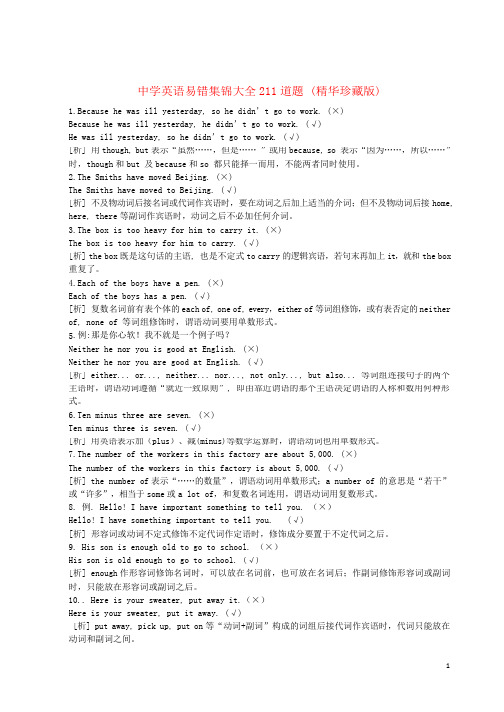
in China. (√)
[析] “any city in China”包括了重庆这座城市, 同一事物自己与自己不能做比较,只有在 city
前加上 other 才能表示重庆和中国的其它城市比较大小。
The weather in Guangzhou is warmer than Beijing. (×)
B.
So he is(√)
[析] “so+be 动词/助动词+主语”的倒装结构表示前面所述情况也适用于后者,意为“……也是这
样”;“so+主语+be 动词/助动词”的陈述结构表示对前述情况的肯定,意为“……确实如此”。
13.重庆比中国的其他城市都大。
Chongqing is larger than any city in China. (×)Chongqing is larger than any other city
married/will marry with B。
15. 例 There is going to have a film tonight. (×) There is going to be a film tonight.
(√)
[析] 一般将来时用在 There be 句式中时,be going to 或 will 之后的动词原形只能用 be,也就
[析] 习惯上在含有宾语从句的复合句中,主句的谓语动词用了一般过去时,从句的谓语动词要用
过去的某种时态。但如果从句表述的是一客观事实或客观真理时,则不受主句时态的影响,l the balls are not round. 翻译成汉语:
所有的球都不是圆的。(×)并不是所有的球都是圆的。(√)
A.
7 minutes walk B. 7 minute walk C. 7 minutes' walk D. 7 minute's walk
中考英语 易错集锦大全211道题

中学英语易错集锦大全211道题 (精华珍藏版)1.Because he was ill yesterday, so he didn’t go to work. (×)Because he was ill yesterday, he didn’t go to work. (√)He was ill yesterday, so he didn’t go to work. (√)[析] 用though, but表示“虽然……,但是……”或用because, so 表示“因为……,所以……”时,though和but 及because和so 都只能择一而用,不能两者同时使用。
2.The Smiths have moved Beijing. (×)The Smiths have moved to Beijing. (√)[析] 不及物动词后接名词或代词作宾语时,要在动词之后加上适当的介词;但不及物动词后接home, here, there等副词作宾语时,动词之后不必加任何介词。
3.The box is too heavy for him to carry it. (×)The box is too heavy for him to carry. (√)[析] the box既是这句话的主语, 也是不定式to carry的逻辑宾语,若句末再加上it,就和the box重复了。
4.Each of the boys have a pen. (×)Each of the boys has a pen. (√)[析] 复数名词前有表个体的each of, one of, every,either of等词组修饰,或有表否定的neither of, none of 等词组修饰时,谓语动词要用单数形式。
5.例:那是你心软!我不就是一个例子吗?Neither he nor you is good at English. (×)Neither he nor you are good at English. (√)[析] either... or..., neither... nor..., not only..., but also... 等词组连接句子的两个主语时,谓语动词遵循“就近一致原则”, 即由靠近谓语的那个主语决定谓语的人称和数用何种形式。
中考英语 易错集锦大全211道题

中学英语易错集锦大全211道题 (精华珍藏版)1.Because he was ill yesterday, so he didn’t go to work. (×)Because he was ill yesterday, he didn’t go to work. (√)He was ill yesterday, so he didn’t go to work. (√)[析] 用though, but表示“虽然……,但是……”或用because, so 表示“因为……,所以……”时,though和but 及because和so 都只能择一而用,不能两者同时使用。
2.The Smiths have moved Beijing. (×)The Smiths have moved to Beijing. (√)[析] 不及物动词后接名词或代词作宾语时,要在动词之后加上适当的介词;但不及物动词后接home, here, there等副词作宾语时,动词之后不必加任何介词。
3.The box is too heavy for him to carry it. (×)The box is too heavy for him to carry. (√)[析] the box既是这句话的主语, 也是不定式to carry的逻辑宾语,若句末再加上it,就和the box重复了。
4.Each of the boys have a pen. (×)Each of the boys has a pen. (√)[析] 复数名词前有表个体的each of, one of, every,either of等词组修饰,或有表否定的neither of, none of 等词组修饰时,谓语动词要用单数形式。
5.例:那是你心软!我不就是一个例子吗?Neither he nor you is good at English. (×)Neither he nor you are good at English. (√)[析] either... or..., neither... nor..., not only..., but also... 等词组连接句子的两个主语时,谓语动词遵循“就近一致原则”, 即由靠近谓语的那个主语决定谓语的人称和数用何种形式。
中考英语 易错集锦大全211道题

中学英语易错集锦大全211道题 (精华珍藏版)1.Because he was ill yesterday, so he didn’t go to work. (×)Because he was ill yesterday, he didn’t go to work. (√)He was ill yesterday, so he didn’t go to work. (√)[析] 用though, but表示“虽然……,但是……”或用because, so 表示“因为……,所以……”时,though和but 及because和so 都只能择一而用,不能两者同时使用。
2.The Smiths have moved Beijing. (×)The Smiths have moved to Beijing. (√)[析] 不及物动词后接名词或代词作宾语时,要在动词之后加上适当的介词;但不及物动词后接home, here, there等副词作宾语时,动词之后不必加任何介词。
3.The box is too heavy for him to carry it. (×)The box is too heavy for him to carry. (√)[析] the box既是这句话的主语, 也是不定式to carry的逻辑宾语,若句末再加上it,就和the box重复了。
4.Each of the boys have a pen. (×)Each of the boys has a pen. (√)[析] 复数名词前有表个体的each of, one of, every,either of等词组修饰,或有表否定的neither of, none of 等词组修饰时,谓语动词要用单数形式。
5.例:那是你心软!我不就是一个例子吗?Neither he nor you is good at English. (×)Neither he nor you are good at English. (√)[析] either... or..., neither... nor..., not only..., but also... 等词组连接句子的两个主语时,谓语动词遵循“就近一致原则”, 即由靠近谓语的那个主语决定谓语的人称和数用何种形式。
- 1、下载文档前请自行甄别文档内容的完整性,平台不提供额外的编辑、内容补充、找答案等附加服务。
- 2、"仅部分预览"的文档,不可在线预览部分如存在完整性等问题,可反馈申请退款(可完整预览的文档不适用该条件!)。
- 3、如文档侵犯您的权益,请联系客服反馈,我们会尽快为您处理(人工客服工作时间:9:00-18:30)。
中学英语易错集锦大全211道题 (精华珍藏版)1.Because he was ill yesterday, so he didn’t go to work. ( )Because he was ill yesterday, he didn’t go to work. ( ) He was ill yesterday, so he didn’t go to work. ( )2.The Smiths have moved Beijing. ( )The Smiths have moved to Beijing. ( )3.The box is too heavy for him to carry it. ( )The box is too heavy for him to carry. ( )4.Each of the boys have a pen. ( )Each of the boys has a pen. ( )5.例:那是你心软!我不就是一个例子吗?Neither he nor you is good at English. ( )Neither he nor you are good at English. ( )6.Ten minus three are seven. ( )Ten minus three is seven. ( )7.The number of the workers in this factory are about 5,000. ( )The number of the workers in this factory is about 5,000. ( )8. 例. Hello! I have important something to tell you. ()Hello! I have something important to tell you. ( )9. His son is enough old to go to school. ()His son is old enough to go to school. ( )10.. Here is your sweater, put away it.()Here is your sweater, put it away. ( )11. Look! Here the bus comes.()Look! Here comes the bus.()12. I do well in playing football, _______. (我妹妹也行。
)A. so my sister does()B. so does my sister()Li Lei is really a football fan. --- _______. (确实这样.) A. So is he() B. So he is()13.重庆比中国的其他城市都大。
Chongqing is larger than any city in China.( )Chongqing is larger than any other city in China.( )The weather in Guangzhou is warmer than Beijing. ( )The weather in Guangzhou is warmer than that in Beijing .( )14, His sister married with a teacher last summer.( )Hissister married a teacher last summer. ( )marry with B。
15. 例There is going to have a film tonight. ( )There is going to be a film tonight. ( )16. 例I’ll go hiking if it won’t rain next Sunday. ( )I’ll go hiking if it doesn’t rain next Sunday.( )17.例Teacher told us yesterday that the earth went aroundthe sun. ( )Teacher told us yesterday that the earth goes around thesun. ( )18. All the balls are not round. 翻译成汉语:所有的球都不是圆的。
( )并不是所有的球都是圆的。
( )19. 例--- He didn’t go to school yesterday, did he?--_______, though he didn’t feel very well.A. No, he didn’t ( )B. Yes, he did ( )例--- Don’t you usually come to school by bike?-- _______.But I sometimes walk.A. No, I don’t ( )B. Yes, I do ( )20.---- Excuse me, is the supermarket far from here?----No,it's about _______.A. 7 minutes walkB. 7 minute walkC. 7minutes' walk D. 7 minute's walk21. You can not imagine how much I ______ on this dress. Isit beautiful?A. paidB. tookC. costD. spent22. ---- Do you know _____ university student who is talkingwith Joe?---- Yes,she,s my cousin, Kate.A. aB. anC. theD. /23. The number of giant pandas is getting ______ becausetheir living areas are becoming farmlands.A. less and lessB. larger and largerC. smaller andsmaller D. fewer andfewer24. Be careful when you come _______ the street,becausethe traffic is very busyat the moment.A. across B. behind C. between D. over25. ---- Do you often clean your classroom?---- Yes, ourclassroom ______ every day.A. cleanB. cleansC. is cleanedD. Cleaned26. Lucy usually cleans the cage every two days. (对画线部分提问)_ _______ Lucy usually clean the cage?27. I didn't understand __________,so I raised my hand toask...A. what my teacher saysB. what does my teacher sayC.what my teacher said D. what did my teacher say28. ---- How much ______ the shoes?---- Five dollars______ enough.A. is;isB. are;isC. are;areD. is;are29. 〕We got to the top of the mountain in daybreak.〔〕We got to the top of the mountain at day break.30. 〔〕Dont sleep at daytime 〔〕Dont sleepin daytime.31. 〔〕He became a writter at his twenties 〔〕He became a writter in his twenties32. 〕We went to swim in the river in a very hot day.〔〕We went to swim in the river on a very hot day.33. 〔〕Im looking forward to seeing you on Christmas.〔〕Im looking for ward to seeing you at Christmas.34. I havent see you during the summer holidays.I havent seen you since the beginning of the summer holidays.35. 〔〕At entering the classroom, I heard the good news. 〔〕On entering the classroom, I heard the good news.36. 〔〕In the beginning of the book, there are some interesting stories. 〔〕At the beginning of the book, there are some interesting stories.37. 〔〕Till the end of next week. I will have finished this work. 〔〕By the end of next week. I will have finished this work. 则表达其一动作一直持续到某一时刻,但句中的动词一定要用持续性动词,而瞬间的截止性动词应用其否定句式,如:I wont finish this work till(until) next weekend.38. 〔〕He came to London before last weekend. 〔〕He had come to London before last weekend. 〔〕He came to London two weeks ago.39. 〔〕I have studied English for three years gince I had come here. I have studied English for three years since I came here.40. 〔〕I can help you repair this bike. You will get it after two hours. 〔〕I can help you repair this bike. You will get it in two hours.所以在许诺若干时间内会完成某事时,一定要用介词in。
